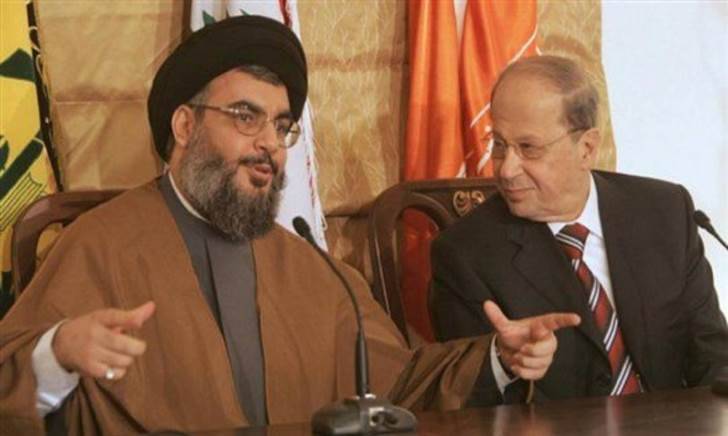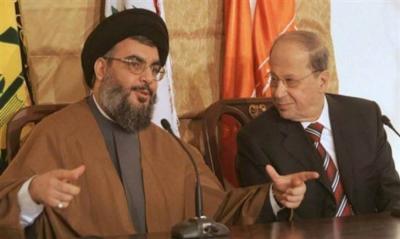The statements from Hezbollah and the Free Patriotic Movement, along with the distribution of votes during the ninth session to elect a president for the republic on Thursday, can be seen as a sequence of actions and reactions—merely a mutual exchange of negative messages between two allies who have never faced such a challenge to their alliance in the past 16 years. After being accustomed to blame and reproach, both covertly and overtly, it is the first time that one might justify their positions as they stand on the brink of more than just disagreement and conflict. Some observers interpret this as a warning of an impending separation, suggesting that while divorce may not be immediate, it is no longer a distant prospect. Others within the adversarial camp view what has occurred as a natural consequence of the post-Michel Aoun presidency phase. They trace the roots of the "Maronite Agreement" to an early bargain from 2006 that supported Aoun's arrival at the presidency in exchange for providing Christian cover for the party's weapons domestically, leading to a justification for the dissolution of this agreement since the need for it has diminished, as has the ability to repeat a similar bargain for the next Lebanese presidency.
The critics point out at least two observations:
First, Hezbollah is no longer capable, particularly given the balance of power in the Parliament, of imposing a president on other factions whom they either do not want or disagree with. The passage of time between 2014 and 2016 led all involved parties to accept that there would be no president unless it was Aoun himself. That debt was settled once the previous president's term ended.
Second, both sides of the "Maronite Agreement" have simultaneously expressed a dual fear that appears common in timing but differs in substance. Their fears have now become parallel concerns, walking side by side after being identical for a decade and a half: Hezbollah fears the loss of a strong Christian ally despite what Secretary-General Hassan Nasrallah says about resistance no longer needing consensus and being able to protect itself without asking any internal faction for protection. This places Hezbollah in direct confrontation with all other religious sects. Following the Sunnis and Druze, the Christians are now beheld as potential adversaries. This fear echoes what the head of the Free Patriotic Movement fears as well: that a divorce from Hezbollah will leave him vulnerable to perceived predation and "gnawing," as he finds himself surrounded by opponents and enemies with the end of Aoun's term—enemies who embody the full meaning of the term. The Sunnis, Druze, half of the Christians, and half of the Shiites, not to mention the other half of the Shiites, will be less supportive if he distances himself. Thus, both the party and the movement find themselves hesitant about separation unless pushed into it.
Perhaps it could be said that one side possesses a privilege that the other lacks. The Free Patriotic Movement's exit from power, losing significant and influential positions, strips it of nearly everything except its grassroots base, which would then lose its capacity for growth. In contrast, Hezbollah's real support, its weapons on the ground, is more effective than its presence within the power structure.
The conclusion for the observers is that the allies of the "Maronite Agreement" now face their hardest choices. The revealing truth they confront—and what has transpired in the recent days from the cabinet session to the ninth presidential election session—is additional evidence that both know they can no longer give each other everything requested. The most telling expression exemplifying the situation between the allies is that Hezbollah cannot provide Bassil with everything he wants, nor can Bassil keep pace with Hezbollah in everything it demands.
The results of the last Thursday session, with 39 blank votes against 39 for MP Michel Moawad and 27 votes distributed among invalid and other candidate names, nearly approaching a third of the required number for both sides in the electoral standoff, revealed a negative indicator regarding Hezbollah's approach to the presidential seat it wishes to secure with a candidate it trusts.
Consequently, several elements have arisen from the recent developments between the two, following the cabinet meeting (December 5) and the ninth presidential election session on Thursday:
1. Despite Bassil's meeting with the party's MPs Ali Ammar and Hassan Fadlallah on the sidelines of the presidential election session, dialogue between the two sides has not yet commenced. Some informed sources suggest this will start in earnest before next Monday, once tempers have cooled down a bit, and they are prepared to talk calmly under the premise that neither of them desires divorce.
2. The anticipated initial outcomes from their upcoming dialogue should lead to an agreement on managing their differences regarding the issues for the next phase. In reality, there are two main files separating them: the presidency and any upcoming cabinet meetings if summoned again.
3. Both parties do not want the expectations from one another to damage their alliance to the point of betrayal. Recently, their disagreement over the caretaker government's meeting has become significant and concerning, which was the immediate reason for the heightened rhetoric leading up to the presidential election session. However, such disagreements can be resolved, as evident in the Monday session where it became clear that Hezbollah, through its ministers, provided the necessary quorum for its convening, and it certainly is capable of preventing it too. Bassil lacked the required quorum after his Minister of Industry withdrew, putting the constitutional and political quorum in Hezbollah's hands. Henceforth, what Hezbollah can impose on Prime Minister Najib Mikati for future meetings needs to acknowledge that Bassil is central to the equation for managing power during the presidential vacancy and a primary partner in the session and the resolutions that stem from it; they cannot ignore him or act as if he is dispensable.
4. Hezbollah is aware of the current realities surrounding the presidential elections. It does not possess the two-thirds majority required to convene a session to elect its candidate Suleiman Frangieh, nor can it convince Bassil to vote for the former MP from Zgharta. Furthermore, it cannot accept any other candidate suggested by Bassil or anyone else for a presidency that does not inspire confidence. More so, it understands that the regional and international circumstances are not conducive to electing its candidate as they were in 2016 when an implicit agreement between the Americans during President Barack Obama's administration and the Iranians facilitated Aoun's election as president.




